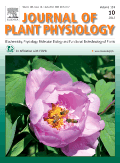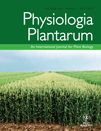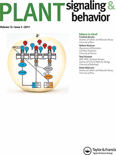
JOURNAL OF PLANT PHYSIOLOGY
Scope & Guideline
Innovating Insights for Sustainable Agriculture
Introduction
Aims and Scopes
- Plant Stress Responses:
Research that investigates how plants respond to abiotic stresses such as drought, salinity, heat, and nutrient deficiencies, highlighting physiological adaptations and molecular pathways. - Plant-Microbe Interactions:
Studies exploring the interactions between plants and microorganisms, including beneficial relationships with mycorrhizae and rhizobacteria, and their impact on plant health and stress resilience. - Hormonal Regulation:
Investigations into the roles of plant hormones (e.g., auxins, gibberellins, ethylene) in regulating growth, development, and stress responses, including their signaling pathways and interactions. - Genetic and Molecular Mechanisms:
Research focused on the genetic and molecular bases of traits related to stress tolerance, growth, and development, including gene expression studies and functional genomics. - Metabolic Pathways:
Studies analyzing the metabolic processes in plants, including carbon and nitrogen metabolism, photosynthesis, and secondary metabolite production, particularly in response to environmental changes. - Ecophysiology:
Research that examines the physiological adaptations of plants in relation to their ecological contexts, including studies on plant responses to varying environmental conditions.
Trending and Emerging
- Climate Change Adaptation:
Research focusing on how plants adapt to changing climate conditions, including studies on physiological mechanisms that enhance resilience to temperature fluctuations and altered precipitation patterns. - CRISPR and Genetic Engineering:
The application of CRISPR technology and other genetic engineering methods to create plants with enhanced traits for stress tolerance, yield, and nutritional quality is a rapidly growing area of interest. - Microbiome Research:
Emerging studies on the plant microbiome and its role in plant health, stress tolerance, and nutrient uptake, reflecting a growing recognition of the importance of microbial communities in plant physiology. - Sustainable Agriculture Practices:
Research on innovative agricultural practices that promote sustainability, including studies on plant-microbe interactions, organic farming, and the use of biostimulants to enhance plant growth and resilience. - Omics Approaches:
An increase in the use of transcriptomics, metabolomics, and proteomics to uncover complex plant responses to environmental stresses and to identify key regulatory networks within plants.
Declining or Waning
- Traditional Breeding Techniques:
Research focusing on conventional plant breeding methods has diminished, likely due to the rise of advanced techniques such as CRISPR and other genetic engineering approaches that offer more precise modifications. - Basic Descriptive Studies:
There is a noticeable decline in purely descriptive studies that do not involve mechanistic insights or experimental validation, as the field increasingly emphasizes hypothesis-driven research. - Single-Environment Studies:
Research that focuses on plant responses in isolated or single environments is waning, with a shift towards multi-environment and climate-resilient studies that consider broader ecological interactions. - Non-Model Organism Research:
The focus on non-model plant species has decreased as funding and interest have shifted towards model organisms like Arabidopsis and economically important crops, which provide more immediate applications.
Similar Journals

Annual Plant Reviews Online
Exploring Sustainable Solutions for AgricultureAnnual Plant Reviews Online, published by WILEY, serves as a premier academic resource dedicated to the evolving field of plant sciences, including specialties in agronomy, horticulture, and food science. With an impressive Q1 ranking in Horticulture and Q2 classifications in Agronomy, Crop Science, and Plant Science, this journal reflects a high standard of scholarly contribution, evidenced by its positioning in the 75th percentile range among agricultural and biological sciences in leading Scopus rankings. Aimed at researchers, professionals, and students alike, the journal covers a broad spectrum of plant-related topics and trends, aiming to enhance the understanding of plant biology and its applications. Offering timely insights and critical reviews, Annual Plant Reviews Online connects the global community with essential knowledge, supporting advancements in sustainable practices and innovations in agriculture. Researchers and students can access its content seamlessly, contributing to ongoing discussions in plant science and fostering academic growth.

Annual Review of Plant Biology
Advancing Knowledge in Plant BiologyThe Annual Review of Plant Biology, published by Annual Reviews, stands as a premier academic journal dedicated to the comprehensive coverage of significant developments in the field of plant biology. With an impactful presence in the United States and a stellar reputation reflected in its Q1 rankings across multiple categories including Cell Biology, Molecular Biology, Physiology, and Plant Science, this journal consistently ranks among the top within its domain. The journal is particularly esteemed for its synthesis of the latest research findings, making it an invaluable resource for researchers, professionals, and students seeking in-depth insights and advancements in plant biology. Though it does not offer open access, the Annual Review of Plant Biology is essential for those committed to exploring the intricate mechanisms underlying plant function and development, with coverage spanning from 1996 to 2024. As the field continues to evolve, this journal will undoubtedly remain at the forefront, driving innovation and fostering a deeper understanding of plant sciences.

ACTA PHYSIOLOGIAE PLANTARUM
Exploring the intricacies of plant physiology.ACTA PHYSIOLOGIAE PLANTARUM, published by Springer Heidelberg, is a leading journal dedicated to advancing the fields of Agronomy, Plant Science, and Physiology. With an ISSN of 0137-5881 and an E-ISSN of 1861-1664, this esteemed publication has a significant global outreach, being based in Germany. The journal is recognized for its impactful contributions, currently holding a Q2 ranking in both Agronomy and Crop Science, as well as Plant Science, and a Q3 ranking in Physiology according to 2023 category quartiles. Its Scopus rankings reflect its reputable standing within the academic community, with notable placements in Agricultural and Biological Sciences, further highlighting its importance for researchers and professionals in the field. The objective of ACTA PHYSIOLOGIAE PLANTARUM is to foster robust discussions and disseminate innovative studies that enhance our understanding of plant physiology and its applications. Though not an open-access journal, it provides comprehensive access options for readers keen on exploring cutting-edge research that drives advancements in agricultural productivity and sustainability. Through its dedication to excellence, this journal continues to be a vital resource for advancing knowledge and practices in plant sciences.

Current Plant Biology
Transforming Knowledge in Plant BiologyCurrent Plant Biology is a distinguished peer-reviewed journal published by ELSEVIER, focusing on the dynamic and rapidly evolving field of plant sciences. Since its inception as an Open Access publication in 2014, it has established itself as a leading platform for innovative research, boasting a remarkable Impact Factor that underscores its relevance and contribution to the scientific community. Based in the Netherlands, this journal caters to a diverse audience of researchers, professionals, and students, facilitating the dissemination of key findings in an array of disciplines including biochemistry, genetics, cell biology, and developmental biology. Recognized for its rigorous standards, Current Plant Biology holds a prestigious standing, classified within the Q1 and Q2 quartiles of various Scopus categories, reflecting its impact and reputation in the realms of Plant Science and related fields. The journal is committed to providing accessible and high-quality research outputs that inspire further investigation and collaboration in plant biology.

PHYSIOLOGIA PLANTARUM
Charting New Territories in Plant Research and GeneticsPHYSIOLOGIA PLANTARUM, published by WILEY, is a prestigious journal in the fields of plant science, physiology, and genetics, known for its impactful contributions since its inception in 1948. With an impressive impact factor and a consistent ranking in the Q1 and Q2 quartiles, it stands out in critical disciplines such as cell biology and biochemistry, ranking #24 in Plant Science with a remarkable 95th percentile standing. This journal primarily serves researchers and professionals committed to advancing the understanding of plant functions, responses, and their molecular mechanisms. Its broad scope allows for a diverse array of studies, ensuring that groundbreaking research is accessible to the global scientific community. Although it does not offer Open Access, PHYSIOLOGIA PLANTARUM remains a vital resource for scholars looking to stay at the forefront of plant biology and related fields.

BOTANICAL REVIEW
Shaping the future of plant research through rigorous scholarship.BOTANICAL REVIEW is a highly esteemed journal published by SPRINGER, renowned for its commitment to advancing the fields of Ecology, Evolution, Behavior and Systematics and Plant Science. Established in 1935, this journal has become a cornerstone for researchers and professionals, reflecting over eight decades of rigorous scholarship. With an impressive impact factor and ranking within the top quartile for both its fields—Q1 in Ecology, Evolution, Behavior and Systematics and Plant Science—BOTANICAL REVIEW remains a key platform for disseminating critical findings and fostering scientific dialogue. Although it is not an open-access journal, its accessibility through institutional subscriptions enhances its reach among the academic community. The journal not only emphasizes the ecological aspects of plant life but also integrates evolutionary context to inform current practices and theories in botany. With a dedication to exploring the complex interactions within botanical sciences, BOTANICAL REVIEW continues to shape the future of plant research.

RUSSIAN JOURNAL OF PLANT PHYSIOLOGY
Fostering Innovation in Plant BiochemistryRUSSIAN JOURNAL OF PLANT PHYSIOLOGY, an esteemed publication with ISSN 1021-4437 and E-ISSN 1608-3407, is dedicated to advancing knowledge in the field of plant science. Published by PLEIADES PUBLISHING INC in the United States, this journal serves as a critical platform for researchers, professionals, and students aiming to explore the intricacies of plant physiology, biochemistry, and environmental interactions. With a consistent output from 1996 to 2024, the journal holds a commendable position within the academic community, reflected in its Q3 ranking among 516 journals in the Plant Science category (2023) and a competitive 44th percentile ranking in the Scopus database. Although the journal is not Open Access, it continues to attract a diverse readership of scholars eager to publish groundbreaking research. It stands out as a vital resource for anyone engaged in understanding the physiological processes that underpin plant life, thereby contributing to global agricultural advancements and ecological sustainability.

JOURNAL OF PLANT BIOCHEMISTRY AND BIOTECHNOLOGY
Bridging Research and Application in Crop ScienceJOURNAL OF PLANT BIOCHEMISTRY AND BIOTECHNOLOGY, published by SPRINGER INDIA, is a leading publication dedicated to advancing research in the fields of plant biochemistry, biotechnology, agronomy, and crop science. With an ISSN of 0971-7811 and E-ISSN 0974-1275, the journal encompasses a wide range of studies aimed at enhancing our understanding of plant biological processes and their applications in agriculture and biotechnology. It has achieved a noteworthy Q2 ranking in Agronomy and Crop Science and Plant Science, as well as a Q3 ranking in Biotechnology, reflecting its quality and relevance in contemporary research. Notably, the journal ranks #166 in Plant Science and #133 in Agronomy, both falling in the top 67th percentile. With a rich history spanning from 1992 to 2024, the journal is committed to providing open access to innovative research findings that bridge the gap between laboratory discoveries and their practical applications in sustainable agriculture. Researchers, professionals, and students will find a wealth of knowledge and inspiration to advance their work in the dynamic field of plant sciences at this esteemed journal.

Plant Signaling & Behavior
Bridging Science and Nature: The Language of PlantsPlant Signaling & Behavior is a prestigious journal published by TAYLOR & FRANCIS INC, dedicated to advancing the understanding of the complex signaling mechanisms and behavioral responses of plants. With an ISSN of 1559-2316 and an E-ISSN of 1559-2324, it has firmly established itself in the field of Plant Science, earning a Q1 ranking in the 2023 category quartiles and ranking #83 out of 516 in Agricultural and Biological Sciences, placing it in the 84th percentile according to Scopus metrics. The journal serves as a vital platform for researchers and professionals looking to publish innovative studies and reviews that explore the intricate relationships between plant behavior and environmental signaling. With coverage spanning from 2006 to 2024, Plant Signaling & Behavior not only enhances academic discourse but also supports the growing interdisciplinary nature of plant sciences. Although the journal is not open access, it remains a significant resource for students, researchers, and practitioners aiming to deepen their understanding of plant signaling and its implications for ecology and agricultural practices.

Journal of Integrative Plant Biology
Pioneering Integrative Approaches in Plant BiologyThe Journal of Integrative Plant Biology, published by WILEY, is a premier academic journal that has been at the forefront of advancing research in plant biology since its inception in 2005. With a notable impact factor and a robust Scopus ranking—positioned at #7 out of 516 in Plant Science and #18 out of 438 in Biochemistry—this journal is recognized as a Q1 journal in multiple categories, including Biochemistry and Plant Science. The journal aims to bridge the gaps between various disciplines in plant research, emphasizing integrative and interdisciplinary approaches to understanding plant biology. With options for open access, the Journal of Integrative Plant Biology ensures broad visibility and impact of research findings, making it an invaluable resource for researchers, professionals, and students looking to stay informed on innovative advancements in the field. Its headquarters are located in the United Kingdom, further amplifying its reach within the global academic community.